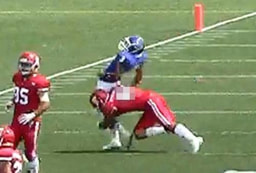
Then things become murky. Nihon University’s coaching staff, mainly consisting of former head coach Uchida Masahito and coach Inoue Tsutomu, initially denied that they had instructed the player to deliberately perform a dangerous tackle on the opposing quarterback. This did little to placate the coaching staff of Kwansei or the father of the injured quarterback, who held their own press conference in which they voiced their anger at how Nihon University was treating the matter. They were particularly incensed by former coach Uchida’s comments made to sections of the media following the game, in which he said that “if you don’t do that, you won’t win”, thereby admitting some involvement in the decision to make the tackle. Pressure continued to build on the Nihon University coaching staff, so much so that Uchida was eventually forced to resign from his position not only as a coach but also as a member of the university’s executive committee.
Yet the matter did not end there. Kwansei Gakuin pointed to a section of a letter received from Nihon University which ostensibly apologised for the incident, but stated that the problem had occurred because there was “a gap in understanding between the directions issued by the coaching staff and the manner in which the player received them”, thereby hoisting the blame for the tackle onto the Nihon player. The injured player’s father also made a reappearance in the media, stating that his son had submitted an aggravated assault complaint against Nihon University with the Osaka Prefectural Police and that he wanted to know whether the Nihon coaching staff had issued a directive for their player to make the dangerous tackle.
The Nihon player then held his own press conference in Tokyo (such was the level of interest in the story from across Japan, as a video of the tackle had been posted to Youtube and had subsequently been picked up by the major news networks), where he apologised to Kwansei Gakuin’s team, the injured player, and revealed that he had been directed by the coaching staff of Nihon to make the tackle after being warned that if he didn’t he would be left out of any subsequent matches. One day later, Uchida and Inoue fronted the media once more, in which they denied giving any directions to deliberately injure the opposing quarterback, although during the same press conference Inoue did admit that he told the Nihon player to ‘crush the opposing quarterback’. Inoue added a proviso to this, however, saying that his expression had been ‘misinterpreted’ by the Nihon player.
To cut a long story short, the Kansai Students American Football Association eventually met on the 30th of May, where Uchida and Inoue both had their qualifications as coaches revoked and Nihon University found its football team suspended for the remainder of the season, along with an obligation to reform its internal practices to ensure no repeat of the incident.
Japanese university team clubs generally conform to the ethos of fair play and responsible conduct, and so the this entire episode served as a focal point for (somewhat obsessive) commentary about the perceived decline in morals within Japanese society and a ‘win-at-all-costs’ mentality by which reputation means nothing and victory must come no matter what. It was also used to demonstrate that despite the passing of 70 or more years, Japanese society still possesses a mindset that puts obedience to hierarchy above all else even though it may be against one’s own best interests and/or morals (a topic that segues nicely into the scandals currently plaguing the Abe government).
That might be reading too much into it, however. What is clear is that the coaching staff of Nihon gave their 19 or 20 something year old player an ultimatum that, given previous comments he presumably received regarding his performance, left him with little choice but to conclude that if he didn’t take out the opposing quarterback he’d be off the team. In hindsight that conclusion appears ironic, but for a young university football player desperate to show his talents and remain on the team, the decision was clear-cut. Of course, the player could have chosen to just tackle the quarterback in a more conventional style, such as after the snap, but maybe he felt that this wouldn’t be enough to satisfy his coaches.
If there is any fault to be found here, it is in the way Nihon University dealt with the problem. Instead of issuing a blanket apology to Kwansei Gakuin, investigating the incident from all sides, and suspending the coaching staff while the investigation was underway, Nihon preferred to remain silent, then contrite, and then attempted to blame the player for the incident. It was cowardice on the part of Nihon to avoid taking responsibility for its actions, although in the current political climate, perhaps that’s only to be expected.
 RSS Feed
RSS Feed